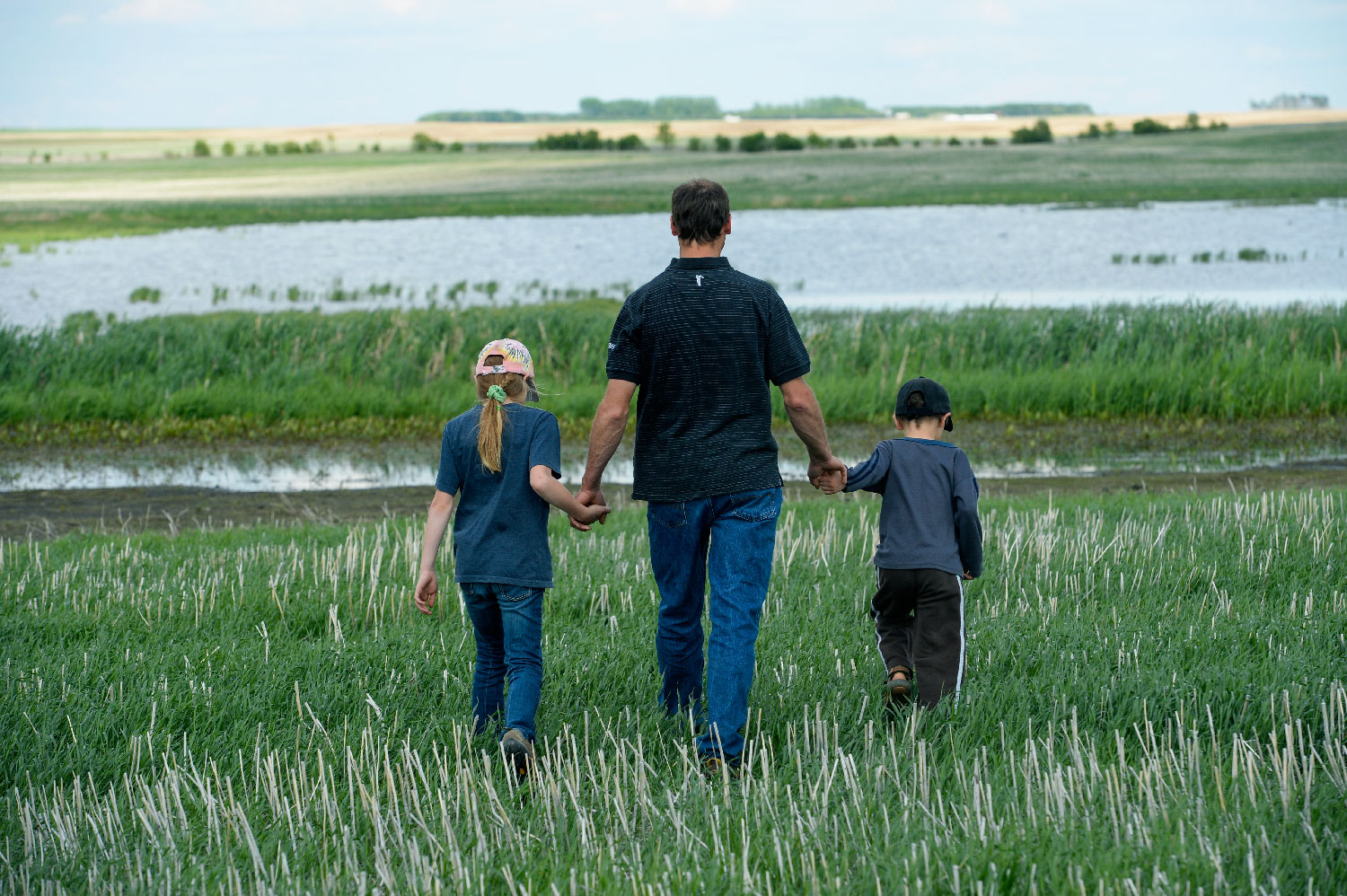ALUS has a long history of helping farmers and ranchers build nature-based solutions on their land to sustain agriculture and biodiversity for the benefit of communities and future generations. Here’s our story.
2000
New Environmentalists
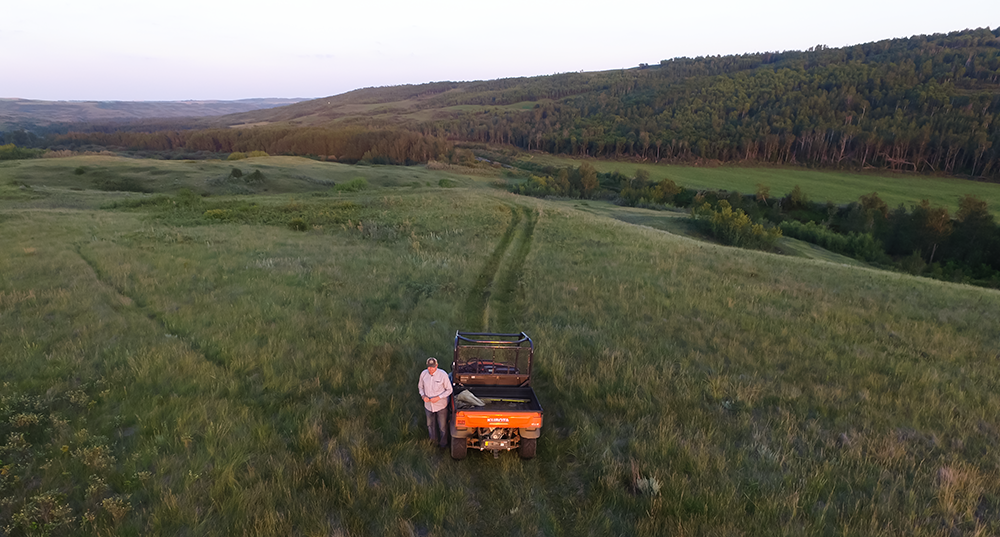
ALUS was born from the recognition that farmers are not only in the business of producing food and fibre, but also ecosystem goods and services that deliver valuable, tangible benefits to Canadians. Kitchen table conversations with farmers and community members about the shortcomings of traditional approaches to farm-based conservation motivated farmer Ian Wishart (then President, Keystone Agricultural Producers) to think up a new approach to conservation. This new approach was called Alternative Land Use Services or ALUS.
2004 – 2007
An Environmental Partnership
Farmers in Norfolk County, Ontario, were ready to prove the ALUS concept. They voluntarily committed personal time, energy, money and land to launch the Norfolk County Pilot Project to test the new model. The purpose, principles and outcomes framing the pilot were identified in Alternative Land Use Services, co-authored by Dr. Robert Bailey (Delta Waterfowl Foundation) and Dave Reid (Norfolk Land Stewardship Council).
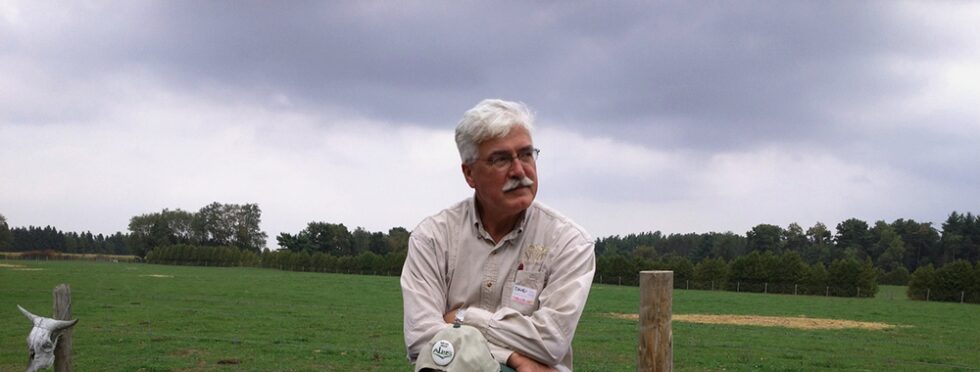
Dave Reid, co-author of Farmer’s Conservation Plan.
According to the Plan, the pilot would test the feasibility of the ALUS model and establish a new environmental business partnership between farmers and Canadians that would create a marketplace for ecosystem goods and services produced through alternative agricultural land use practices. One of the keystone principles guiding implementation and championed by Plan co-author Dave Reid was that this new partnership needed to be administered and managed by the local community through a Partnership Advisory Committee (PAC). Reid believed that community-led programming would engage the community in delivering effective, locally relevant solutions to local environmental issues.
The pilot would officially launch in 2008 with the PAC concept proving to be foundational to its success. Norfolk would go on to become the oldest continuously running ALUS program in Canada and Reid would later serve as ALUS’ Eastern Hub Manager and Director of Research.
Dave Reid: ALUS Pioneer, Conservation Champion
Unforgettable lasting impact. That’s a simple way to describe the contribution that lifelong biologist and former ALUS Eastern Hub Manager and Director of Research, Dave Reid, has made to ALUS. As the co-author of The Farmers Conservation Plan, Reid was one of the original pioneers of the ALUS concept. He worked tirelessly in the 16 years that followed to support the program’s growth, while also keeping it rooted to its principles. “I’ve often referred to [Reid] as the ‘conscience’ of the ALUS program,” says ALUS CEO Bryan Gilvesy. With an unwavering belief in the importance of community involvement in conservation, it’s no surprise it was Reid who insisted on the Partnership Advisory Committee (or PAC) model for ALUS. “And this turns out to have been the key to our success across Canada,” adds Gilvesy. Although Reid retired from ALUS in 2018, his legacy continues. Each year, ALUS awards a farmer or rancher with the Dave Reid Award, a $10,000 cash prize that recognizes outstanding commitment to stewardship.
Meanwhile, in the Rural Municipality of Blanshard, Manitoba, Keystone Agricultural Producers was one step ahead. In collaboration with Delta Waterfowl Foundation, they launched the first ALUS pilot in 2006 under a centralized delivery model with funding from the Government of Manitoba and The W. Garfield Weston Foundation (now known as The Weston Family Foundation). The pilot ended after its three–year term. It wouldn’t be until 2014 that ALUS would re-establish in the community under the PAC model as ALUS Little Saskatchewan River (now Assiniboine West), which would include around a million acres of land within its jurisdiction.
The Weston Family Foundation: Unwavering Support
The Weston Family Foundation (formerly The W. Garfield Weston Foundation) has been an ardent supporter of ALUS and its mission from the beginning. From its involvement in the initial pilot in Blanshard, Manitoba to its most recent investment in 2022 to increase the delivery of nature-based climate solutions across Canada, the Foundation has played an invaluable role in the growth and success of ALUS. Over the course of its sponsorship, the Foundation has invested nearly $17 million in ALUS and its New Acre™ Project and has proven to be a genuine champion of sustainable agriculture and healthy communities.
In addition to supporting ALUS’ work, the Foundation also helps recognize the work of researchers or ALUS partners through The Weston Family Ecosystem Innovation Award. The award recognizes excellence in scientific research on ecosystem services produced on farmland for the public good and is worth $10,000. Winners have included Dr. John Fryxell (2022), Dr. Amy Newman (2020), Dr. Wanhong Yang (2018), and Dr. Andrew MacDougall (2016).
2008 – 2015
Gaining Momentum
Word was spreading.
George T. Webster, then Minister of Agriculture, Prince Edward Island (PEI), had caught wind of ALUS and arrived on-site of the official launch of the Norfolk County Pilot Project in 2008 to see what it was all about. Staring out across a restored field of native tallgrass prairie on Bryan Gilvesy’s farm, YU Ranch (one of the Pilot Project’s first demonstration farms), he needed little convincing the project held promise. Shortly after, PEI became the first and only provincially supported ALUS program. Co-managed by the PEI Department of Agriculture and Fisheries and the PEI Department of Communities, Land and Environment, the program continues to be delivered provincewide.
Other communities were quick to follow and ALUS would soon find itself with a growing waiting list of individuals and organizations wanting to participate.
Communities that joined ALUS between 2008 – 2015
2008
- ALUS Norfolk
- ALUS PEI
2010
- ALUS Vermillion River
2012
- ALUS Elgin
- ALUS Grey-Bruce
- ALUS Ontario East
- ALUS Parkland County
2013
- ALUS Red Deer County
2014
- ALUS Little Saskatchewan River (now Assiniboine West)
2015
- ALUS ASAP
- ALUS Lac St. Anne
- ALUS Lambton
- ALUS Mountain View County
- ALUS Wetaskiwin-Leduc
- ALUS WUQWTR
2016 – 2018
Taking Flight
By the end of 2015, ALUS had a proven program delivery model founded in science, sound governance principles and strong community involvement through the Partnership Advisory Committees (PACs) that administered local ALUS communities. Up until this point, ALUS had been operating under the auspices of the Delta Waterfowl Foundation, but it was time to leave the nest.
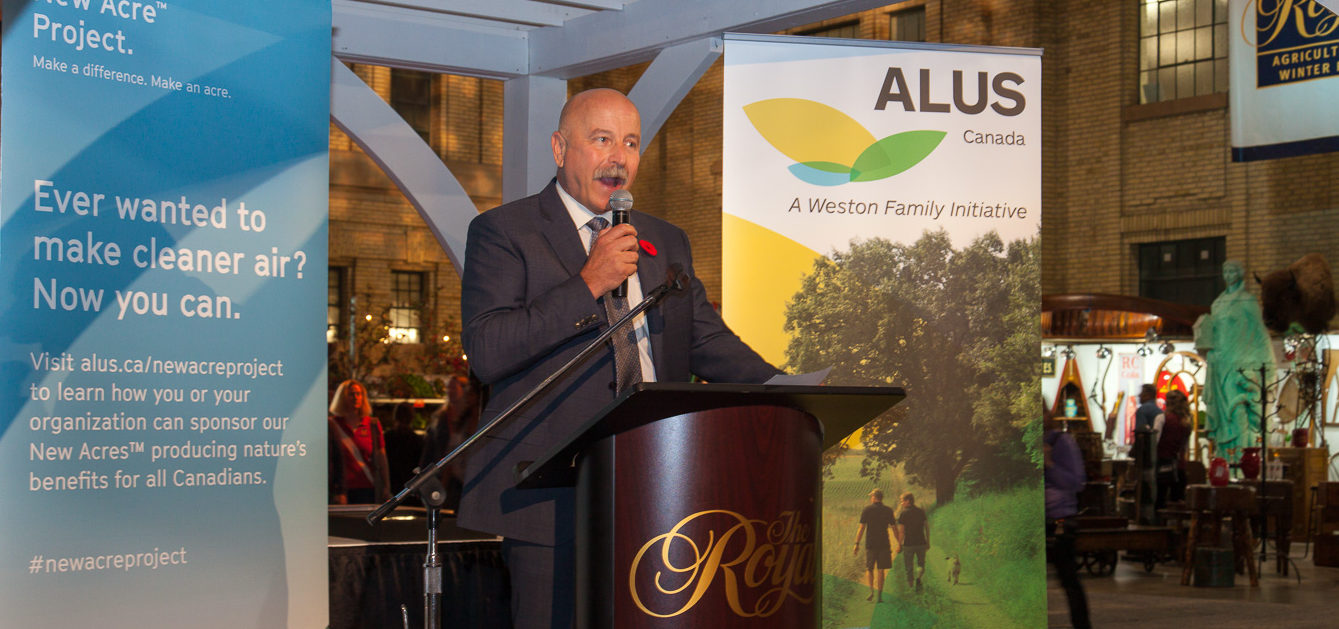
ALUS CEO, Bryan Gilvesy, speaks at the 2016 ALUS relaunch event.
In 2016, ALUS relaunched as ALUS Canada, A Weston Family Initiative—an independent, registered charitable organization—with long-time farmer participant and ALUS volunteer Bryan Gilvesy at the helm and Lynn Bishop managing operations. Coinciding with the relaunch, The W. Garfield Weston Foundation announced a $5 million investment to support ALUS’ expansion across the country and its newly announced corporate sponsorship program, New Acre™ Project. The investment reinforced ALUS as a leader in farm-based conservation and cemented its commitment to delivering ecosystem services in an authentic, sustainable and transparent way.
2018 – 2022
Leading the Way
Demand for nature-based climate solutions was increasing and ALUS was growing to meet it. ALUS began rapidly expanding its national team to increase delivery capacity and in 2018, ALUS brought on Director of Corporate Partnerships and Business Development, Katherine Balpataky, to help purpose-driven corporations meet their Environment, Social and Governance (ESG) goals through New Acre Project. Corporations were beginning to recognize the value of nature and biodiversity both for their businesses and the communities in which they worked and served. They saw New Acre Project as a vehicle to directly invest in the creation of acres of ecosystem goods and services in exchange for tangible, verifiable metrics that told the story of their on-the-ground impact.
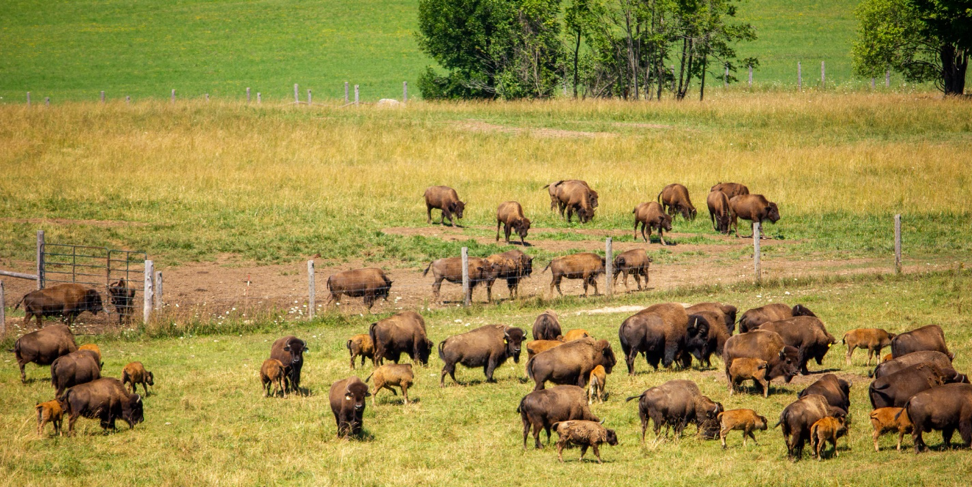
In 2019, TD Bank Group helped officially launch New Acre Project. In 2020, Silk® (Danone Canada) sponsored 90 New Acre™ Project acres of ecosystem services in Alberta, Ontario and Québec. In 2021, ALUS announced a partnership with A&W and Cargill to create Grazing Forward—a three-year initiative to expand regenerative agriculture practices to address climate change within the beef supply chain in 20 communities across Alberta, Saskatchewan and Manitoba. A year later, ALUS also partnered with General Mills on a two-year regenerative agriculture pilot program focused on soil health in Saskatchewan and Manitoba. The pilot project, known as Growing Roots, supports General Mills’ commitment to advance regenerative agriculture on one million acres of farmland by 2030.
But it wasn’t just corporations taking notice. In May 2022, Sustainable Development Technology Canada announced a $5 million investment to increase ALUS’ capacity to deliver across the country and support its work in building ecosystem service quantification models.
Honours, Recognition and Awards
- 2016: The Shared Footprint Award recognizes ALUS impact on the Alberta landscape.
- 2016: Canada’s Clean 16 Award recognizes Bryan Gilvesy (CEO), Lynn Bishop (Director of Operations), Lara Ellis (Director of Strategic Initiatives), Dave Reid (Eastern Hub Manager).
- 2017: Ontario Trillium Foundation Grant establishes ALUS Elgin, Grey-Bruce and Ontario East as permanent ALUS communities.
- 2017: The Bissett Action Fund is established to support agri-environmental projects and helps ALUS farmers maintain close to 200 ALUS projects in southern Alberta.
- 2019: ALUS receives Canadian Nonprofit Employer of Choice Award.
ALUS CEO, Bryan Gilvesy, has also received numerous awards for his stewardship, innovation and commitment to the environment.
By the end of 2023, 39 communities across Canada were delivering the ALUS program and nearly 1,800 farmers and ranchers were working to produce ecosystem goods and services for the benefit of all Canadians.
Communities that joined ALUS between 2016 – 2023
2016
- ALUS Brazeau
- ALUS Flagstaff
- ALUS Montérégie
- ALUS Northern Sunrise
2017
- ALUS Lacombe
2018
- ALUS Chatham-Kent
- ALUS Middlesex
- ALUS Peterborough
- ALUS Rocky View
- ALUS Wheatland
2019
- ALUS Seine Rat Roseau
- ALUS Vulcan
2020
- ALUS Big Lakes
- ALUS SODCAP
- ALUS Two Hills
2021
- ALUS Outaouais
- ALUS Sturgeon
2022
- ALUS Barrhead-Westlock-Athabasca
- ALUS Chaudière-Appalaches
- ALUS Lanark
- ALUS Peel
- ALUS Pincher Creek
2023
- ALUS Laurentides
2024+
The Future
ALUS is driving the development of leading-edge quantification methodologies and metrics to more accurately value nature-based solutions and their outcomes. It will continue to recognize and promote environmental activity as economic activity and work within this framework to better support farmers and ranchers in producing ecosystem services, as well as to help purpose-driven business meet their ES&G objectives.
Join us in making history.
Become an ALUS farmer. Become a corporate sponsor. Connect with us.
